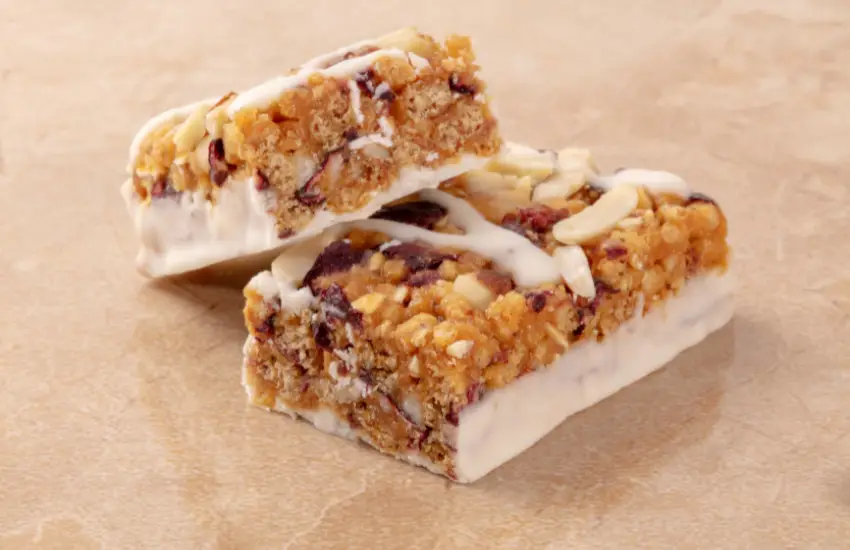Are Protein Bars Good for Hiking?

Are you tired of packing gallons of water and heavy bags of snacks for your trail adventures? Fear not, for there is a solution that will save you some space and weight in your backpack – protein bars!
If you’re new to hiking or just want to refresh your brain, let’s start with the basics. Protein bars are nutritional snacks (sometimes with a foul taste – I’ll be honest here) that provide your body with essential proteins, carbs, and fibers that help you sustain energy levels throughout the day. They come in different flavors, sizes, and types, but all of them are convenient, nutritious, lightweight, and easy to pack, which makes them ideal for hiking.
So in this article, I wanted to get into the benefits, potential drawbacks, and what to look for if you plan on packing some protein bars for your next hike.
Quick Links
Benefits Of Eating Protein Bars While Hiking
Hiking is a rewarding and uplifting experience, but let’s not forget that it can be challenging, especially when we run out of energy or feel hungry in the middle of nowhere. That’s why protein bars can be a hiker’s best friend. They are practical, nutritious, and delicious – here are four reasons why:
1. Quick and Easy Source of Energy: When you’re hiking, the last thing you want is to slow down because you’re running out of energy. Protein bars are a fantastic source of energy that gets digested quickly and give you an instant boost. They usually have a good balance of protein, carbs, and fats that can sustain you for hours.
2. Convenient to Carry and Eat on the Go: We all know that carrying food in our backpacks can add up to the weight, and it’s not always easy to stop and unpack for a meal. Protein bars are practical because they take up little space and can be eaten while you’re walking.
3. High in Protein to Aid Muscle Recovery: Hiking can be hard on our muscles, especially if we’re going uphill or carrying a heavy load. Protein bars are rich in protein, which is essential for muscle building and recovery. They can help you repair any damage done to your muscles and prevent soreness and fatigue.
4. Prevents Hunger and Keeps You Feeling Full: There’s nothing more distracting than feeling hungry when you’re trying to enjoy the scenery. Protein bars contain fiber and are high in protein, both of which are excellent for promoting satiety and keeping you full for longer. They can also prevent you from overeating when you reach your destination and reduce the temptation to snack on unhealthy foods.
What to Look for in a Protein Bar for Your Next Hike
When it comes to hiking, the right gear, clothing, and planning can make a world of difference in your experience. But let’s not forget about snacks – they are an essential part of your backpack, and they can make or break your hike. Protein bars, as stated, are an excellent snack choice because they are lightweight, convenient, and nutritious. However, not all protein bars are made equal. Here’s what to look for when choosing a protein bar for your next hiking trip:
1. High Protein Content: This one should be pretty obvious. Protein is the key nutrient that helps you build and repair muscle tissue, which is essential for hikers who expose their bodies to physical exertion. A good protein bar should have at least 15-20 grams of protein per serving. So that means skip those tasty bars at the supermarket labeled “High In Protein” that only contain around 10g of protein, yet are high in everything else.
2. Low Sugar Content: Many protein bars are loaded with added sugars and artificial sweeteners, which can cause a spike in your blood sugar levels and lead to energy crashes later on. Look for bars that are low in sugar, with less than 8 grams per serving. Again, you’re not looking for the best taste here, you’re looking for the healthiest option.
3. Nutrient-Dense Ingredients: Protein bars are not created equal, and some contain low-quality ingredients, such as refined flours, hydrogenated oils, and fillers. Opt for bars that have whole food ingredients, such as nuts, seeds, oats, and fruits, which provide essential vitamins and minerals. As a plus, if you can find one high in fibers as well – you’ve found a good one.
4. Low Weight and Volume: A protein bar that weighs down your backpack defeats the purpose of having a light and efficient hiking kit. Look for bars that have a low weight and volume, so you can carry them comfortably without sacrificing space or weight. Trust me – some of them can be quite big and bulky (I’m looking at you, MetRX bars.)
As a bonus tip, let me suggest my favorite protein bar brand for hiking, Pure Protein. They have a fantastic variety of flavors (that actually taste GOOD), and their bars are high in protein and low in sugar. I wrote a review on Pure Protein bars if you want to learn more about them, and you can find it here: My Review On Pure Protein Bars.
Are Protein Bars All Sunshine and Rainbows? A Look at the Potential Drawbacks
We’ve spoken about the benefits of protein bars while hiking, the convenience, the energy boost, and the muscle recovery. However, let’s not forget that protein bars are not perfect, and they have some potential drawbacks. Here are a few things to keep in mind before you stockpile your backpack with too many protein bars:
1. Can Be High in Calories: While protein bars are an excellent source of energy, they can also be high in calories, which can be counterproductive if you’re trying to lose weight or maintain your body weight. Make sure to read the labels and choose bars that have a reasonable calorie count, around 200-250 calories per serving. Some of them can go as high as 400-500 calories, so again, make sure to read the labels first.
2. May Contain Artificial Ingredients or Preservatives: As we’ve discussed earlier, it’s best to choose protein bars that have whole food ingredients and avoid those that contain artificial ingredients, flavors, and preservatives. These can be harmful to your health, and cause bloating and digestive issues in some people. Sometimes it’s hard to avoid, as it seems most of them these days have artificial sweeteners.
3. Can Be Expensive Compared to Other Hiking Snacks: Hiking can be a budget-friendly activity, but protein bars can be more expensive than other snacks, such as nuts, seeds, and dried fruits. Make sure to compare prices and choose bars that offer good value for money, considering the number of servings and the quality of the ingredients.
Really, the biggest con here is probably the price. It can get quite expensive – even if you buy in bulk. So weigh your options carefully, and worst case, maybe it can be a one or two times a month treat.
Alternatives to Protein Bars for Hiking
Protein bars are a fantastic hiking snack, but, let’s face it, sometimes you want a different taste, texture, or nutritional profile. In that case, it’s good to know that there are alternatives to protein bars that can satisfy your cravings and energy needs. Here are some options to consider:
1. Nuts and Seeds: Nuts and seeds are a classic hiking snack that can provide you with a range of nutrients, including healthy fats, fiber, and protein. They are also lightweight, easy to pack, and come in various flavors. You won’t get as much protein, however, unless you have substantially more servings of nuts.
2. Trail Mix: Trail mix is an excellent option if you want a mix of sweet and savory flavors. You can customize your trail mix by mixing different nuts, seeds, dried fruits, and chocolate chips. It’s also easy to pack and snack on while you’re hiking.
3. Jerky: Jerky is a protein-rich snack that’s portable and long-lasting. It comes in different meat varieties, such as beef, turkey, and chicken, and it’s perfect for hikers who need a quick protein fix between meals. However, just like protein bars – it can get quite expensive if you’re buying them premade. I wrote more in-depth on beef jerky before, here’s my writeup on beef jerky for hiking, if you’re curious.
4. Energy Gels or Chews: Energy gels or chews are easy to digest, quick energy sources that you can consume while hiking. They come in small packets and contain a blend of carbs, electrolytes, and sometimes caffeine, which can help you overcome fatigue and dehydration.
Remember, you don’t have to stick to one type of snack while hiking. There’s room for variety and experimentation. You can mix and match different snacks based on your preferences, your energy needs, and your budget. Make sure to choose quality ingredients, try and avoid added sugars if possible, and pay attention to the nutrient profile of each snack.
Conclusion
In conclusion, protein bars are an excellent choice for hikers who want a convenient, nutritious, and tasty snack. However, they are not infallible, and they have some potential drawbacks, such as high calories, artificial ingredients, and high cost.
By being mindful and selective in your choices, you can enjoy protein bars while hiking without compromising your health or your budget. And like I said, there are great alternatives if you just can’t stand the taste. So, next time you hit the trails, don’t hesitate to pack some protein bars – but make sure to balance them out with your other hiking snacks. Happy hiking!







